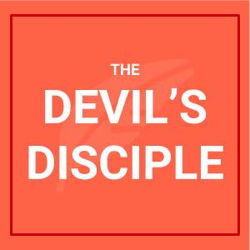
Explore this Show
Overview
Synopsis
Set during the American Revolutionary War, The Devil’s Disciple follows Richard ‘Dick’ Dudgeon, the rakish reprobate of the play’s title who finds himself an unlikely hero. In Websterbridge, New Hampshire, Richard’s wild ways contrast sharply with the Puritanical piety of the townspeople. His family disowns him, his mother curses him -- not that Richard minds in the least. Only Anthony Anderson, the affable, open-minded Presbyterian minister, welcomes him into his home, much to his Judith, his wife’s, disapproval. When British soldiers arrive to arrest the clergyman, Richard finds himself willingly taking Anderson’s place at the gallows. To his -- and everyone else’s -- surprise, the “Devil’s Disciple” may have a hero in him yet. The Devil’s Disciple was Shaw’s first major theatrical success. Filled with Shaw’s classic wit and paradoxical characters, the play continues to amuse, provoke, and surprise audiences over a hundred years later.
Show Information
Context
Plot
Characters
| Name | Part Size | Gender | Vocal Part |
|---|---|---|---|
|
Lead |
Male |
Spoken |
|
|
Lead |
Female |
Spoken |
|
|
Lead |
Male |
Spoken |
|
|
Supporting |
Female |
Spoken |
|
|
Supporting |
Male |
Spoken |
|
|
Supporting |
Female |
Spoken |
|
|
Supporting |
Male |
Spoken |
|
|
Supporting |
Male |
Spoken |
|
|
Supporting |
Male |
Spoken |
|
|
Featured |
Male |
Spoken |
|
|
Featured |
Male |
Spoken |
|
|
Featured |
Male |
Spoken |
|
|
Featured |
Female |
Spoken |
|
|
Featured |
Female |
Spoken |
|
|
Featured |
Male |
Spoken |
|
|
Ensemble |
Male |
Silent |
Songs
A song with an asterisk (*) before the title indicates a dance number; a character listed in a song with an asterisk (*) by the character's name indicates that the character exclusively serves as a dancer in this song, which is sung by other characters.
Monologues
Scenes
Key Terms
A historical event frequently dramatized in plays and musicals that explore national identity, liberty, and rebellion.
An anti-hero is a central character who lacks traditional heroic qualities such as morality, bravery, or idealism. Often flawed and complex, anti-heroes appear frequently in modern drama and literature.
A literary device that reveals a truth through contradiction, often used in dramatic dialogue and themes.
Works not protected by copyright and available for free use or adaptation. Many classical plays, including Shakespeare's, fall into the public domain.
Wit in theatre refers to the quick, clever use of language to create humor or reveal deeper truths about characters and situations. It often relies on sharp wordplay, irony, or unexpected turns of phrase to keep audiences engaged. Wit is commonly found in comedies and serves both to entertain and to highlight human flaws in a lighthearted way.
Videos
Quizzes
Themes, Symbols & Motifs
Sorry! We do not currently have learning modules for this guide.
Quote Analysis
Sorry! We do not currently have learning modules for this guide.
